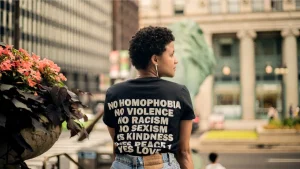Introduction

In today’s diverse world, promoting anti-racism is not just a moral duty; it should be an essential element of a thriving and equitable workplace. This blog will explore steps you can take to create a workplace that champions equality, diversity, inclusion, and equity (EDIE) and is at its core anti-racist.
We’ll also discuss the critical role of line managers, how you can ensure inclusive recruitment and selection and the power of inclusive language. Finally, we will explore how to engage in race conversations, and address the insidious issue of microaggressions.
A Framework of Equality, Diversity, Inclusion, and Equity
EDIE forms the foundation of a workplace that values every individual regardless of their race, ethnicity, or background. Equality ensures that every employee has the same opportunities and treatment, free from discrimination. Diversity celebrates differences and brings varied perspectives to the table, fostering innovation and creativity. Inclusion goes beyond diversity by creating a welcoming environment where all employees feel valued and can contribute fully. Equity acknowledges that different individuals may require different support to achieve equal outcomes, addressing historical imbalances.
The Role of Line Managers
Line managers play a pivotal role in creating an anti-racist workplace. They should lead by example, embodying anti-racist values, and treating all employees equally and fairly. Moreover, managers should promptly address any instances of racism and discrimination, setting clear expectations for behaviour. Encouraging managers to support diversity initiatives, mentorship programs, and affinity groups can also promote inclusivity.

Inclusive Approaches to Recruitment and Selection
Creating a diverse workforce starts with recruitment and selection practices. Ensuring that job postings reach a wide range of candidates, including underrepresented groups, is crucial. Bias training can help hiring managers recognise and eliminate unconscious biases that can affect hiring decisions. Additionally, using diverse interview panels can reduce potential bias and create a more inclusive environment during the selection process.
The Use of Inclusive Language
Language is a powerful tool that can either perpetuate or break down racism. To promote inclusivity, it’s important to steer clear of racial or ethnic stereotypes in communication. Additionally, using individuals’ preferred pronouns and respecting their gender identities demonstrates respect and inclusivity. Being mindful of cultural nuances in language and communication styles can further foster an inclusive workplace.
How to Talk About Race within the Workplace
Open discussions about race are essential. Creating a safe environment where employees can discuss race-related issues without fear is a critical step. Providing diversity, inclusion, and anti-racism training equips employees with the knowledge and tools to engage in constructive conversations. Encouraging active listening during discussions allows all voices to be heard without judgment.
Recognising and Dealing with Microaggressions
Microaggressions are subtle, often unintentional actions or comments that perpetuate stereotypes or biases. Educating employees on what microaggressions are and how they can manifest is a crucial awareness step. Establishing a clear process for reporting and addressing microaggressions ensures confidentiality and accountability. Encouraging individuals to address microaggressions with educational responses can help others understand the impact of their actions.
Conclusion
Anti-racism efforts are crucial for fostering a workplace that values diversity, inclusion, and equity. By implementing a framework of EDIE principles, empowering line managers, promoting inclusive recruitment practices, using respectful language, engaging in open race conversations, and addressing microaggressions, organisations can take significant steps toward eradicating racism and building a more inclusive future. It’s a collective responsibility to dismantle racism and create a workplace where everyone can thrive, regardless of their racial or ethnic background.